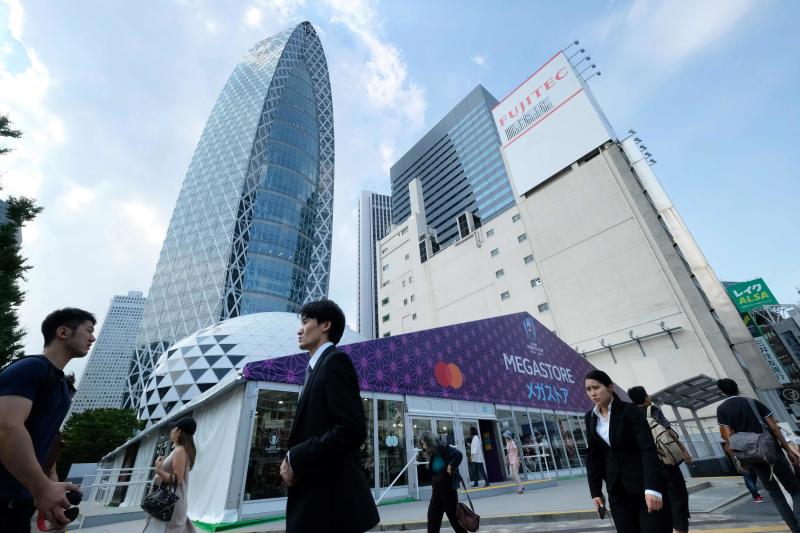Companies in Japan sitting on record $6.64 trillion in cash
Sign up now: Get ST's newsletters delivered to your inbox

While companies see the money as a buffer against hard times, it has long riled investors, who say executives should invest it for growth or return it to shareholders.
PHOTO: AFP
Follow topic:
SINGAPORE (BLOOMBERG) - In banks across Japan sits a pile of money that's bigger than most countries' gross domestic product - the cash reserves of the nation's companies. For some it's a testament to their strength, but to many it's a wasted opportunity.
Firms listed in Japan held 506.4 trillion yen (S$6.64 trillion) in cash as of their latest filings, the highest level on record, according to data compiled by Bloomberg. It's more than tripled since March 2013, months after Prime Minister Shinzo Abe returned to power vowing to stamp out cash-hoarding.
While companies see the money as a buffer against hard times, it has long riled investors, who say executives should invest it for growth or return it to shareholders. In one of his most lauded policies, Mr Abe has overhauled corporate governance structures, seeking to make firms use capital more productively rather than letting it fester in bank accounts.
It's not that the prime minister's efforts haven't borne fruit. Companies are providing larger returns to shareholders since Mr Abe's government instituted new rules for investors and executives starting in 2014. But Zuhair Khan, head of research at Jefferies Japan Ltd, estimates they're only distributing about 40 per cent of profits to stock owners when they could afford to pay out about 70 per cent.
"This Scrooge-like situation needs to be fixed," said Naoki Kamiyama, chief strategist at Nikko Asset Management Co in Tokyo.
The traditional narrative of overly cautious chief executive officers clinging to unnecessarily large amounts of cash no longer tells the whole story, according to Felix Lam, a senior Asia-Pacific equities portfolio manager at BNP Paribas in Hong Kong. Now, rising cash levels are more a function of increasing profits. Earnings per share at companies in the benchmark Topix index in the second quarter of this year were up 80 per cent compared to the three months ended December 2012, data compiled by Bloomberg shows.
"The reason for high cash levels has shifted from being conservative to becoming a result of improving fundamentals," Lam said. "In the last three financial years, Japanese companies' buybacks have reached record high levels and they are mostly financed through their own balance sheet rather than debt."
Announced repurchases by Japan-listed firms rose to about US$60 billion in 2018, according to Goldman Sachs Group estimates. In the first five months of this year, they've already reached about US$50 billion, as companies such as Sony and SoftBank Group announced plans for record buybacks.
At the same time, companies have paid out 8.4 trillion yen in dividends so far in 2019, an all-time high, according to Societe Generale.
But the repurchases still pale in comparison to the US market, where the 500 largest companies announced US$800 billion in buybacks last year, according to Societe Generale.
The Topix rose 0.2 per cent in early trading Tuesday, bringing its gain for this year to just under 1 per cent. The S&P 500 Index is up almost 17 per cent in 2019.
Critics say Japanese businesses aren't doing enough with their money. Mergers and acquisitions, for example, have been muted. Total deals announced by Japan-listed firms this year slumped to about US$95 billion from about US$215 billion in the same period last year, according to data compiled by Bloomberg.
And by holding big piles of cash at zero interest, companies end up with lower returns on equity, according to Soichiro Matsumoto, chief investment officer for Japan at Credit Suisse Group.
Japanese executives' penny-pinching ways are no surprise to many market watchers, who say most firms adopted a conservative attitude when asset prices collapsed in the early 1990s. The ensuing period of economic stagnation, dubbed the lost decades, saw failing financial institutions who could no longer lend to businesses.
Three decades later, company executives still want to be independent of debt financing. "The strategy is to have a lot of cash because that gives you strategic flexibility for acquisitions or a cushion for a rainy day because who knows when the economy might go bad," Khan of Jefferies said.
Looking ahead, investors see the possibility of more change at Japan Inc, as an increasing number of activists target companies with poor shareholder returns. But most say the cash will keep piling up, while profits distributed to stock owners will increase only gradually.
"It is nice that companies are returning more money to investors through higher buybacks," said Nicholas Smith, a strategist at CLSA Ltd in Tokyo. "But it's not nearly enough."

